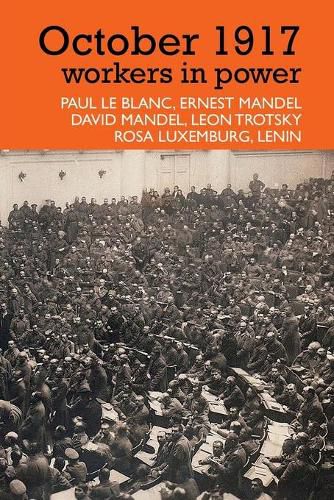Readings Newsletter
Become a Readings Member to make your shopping experience even easier.
Sign in or sign up for free!
You’re not far away from qualifying for FREE standard shipping within Australia
You’ve qualified for FREE standard shipping within Australia
The cart is loading…






Was October 1917 a coup detat or a social revolution? Writing as both a historian and political activist, Ernest Mandel vigorously reasserts the deep legitimacy of the Russian Revolution. He considers mistakes made by the Bolshevik leadership in 1917-21 and sets out lessons to be learnt.David Mandels Factory Committees and Workers Control in Petrograd in 1917 draws on Russian-language archives to tell the story from below. Petrograd workers did not dream at first of socialist experiments. Factory committees met fierce resistance from owners, they were driven to take management into their own hands and to seek the nationalisation of industries. Common conceptions about the utopian and anarchistic impulses supposedly behind the October Revolution are reassessed and refuted.The introduction by Paul Le Blanc, provides a new evaluation of the events one century on. He discusses recent scholarship and debates, new ways of comprehending class, the centrality of women and that of ethnicity, race and national identity, as well as Lars Lihs reassessment of the role of Kamenev and Zinoviev. Paul Le Blanc considers what went right: the revolution that brought bread, peace and land to millions, and what went wrong. Were the Bolsheviks elitist, sectarian and authoritarian? He assesses what is still relevant today and what is not.
$9.00 standard shipping within Australia
FREE standard shipping within Australia for orders over $100.00
Express & International shipping calculated at checkout
Was October 1917 a coup detat or a social revolution? Writing as both a historian and political activist, Ernest Mandel vigorously reasserts the deep legitimacy of the Russian Revolution. He considers mistakes made by the Bolshevik leadership in 1917-21 and sets out lessons to be learnt.David Mandels Factory Committees and Workers Control in Petrograd in 1917 draws on Russian-language archives to tell the story from below. Petrograd workers did not dream at first of socialist experiments. Factory committees met fierce resistance from owners, they were driven to take management into their own hands and to seek the nationalisation of industries. Common conceptions about the utopian and anarchistic impulses supposedly behind the October Revolution are reassessed and refuted.The introduction by Paul Le Blanc, provides a new evaluation of the events one century on. He discusses recent scholarship and debates, new ways of comprehending class, the centrality of women and that of ethnicity, race and national identity, as well as Lars Lihs reassessment of the role of Kamenev and Zinoviev. Paul Le Blanc considers what went right: the revolution that brought bread, peace and land to millions, and what went wrong. Were the Bolsheviks elitist, sectarian and authoritarian? He assesses what is still relevant today and what is not.